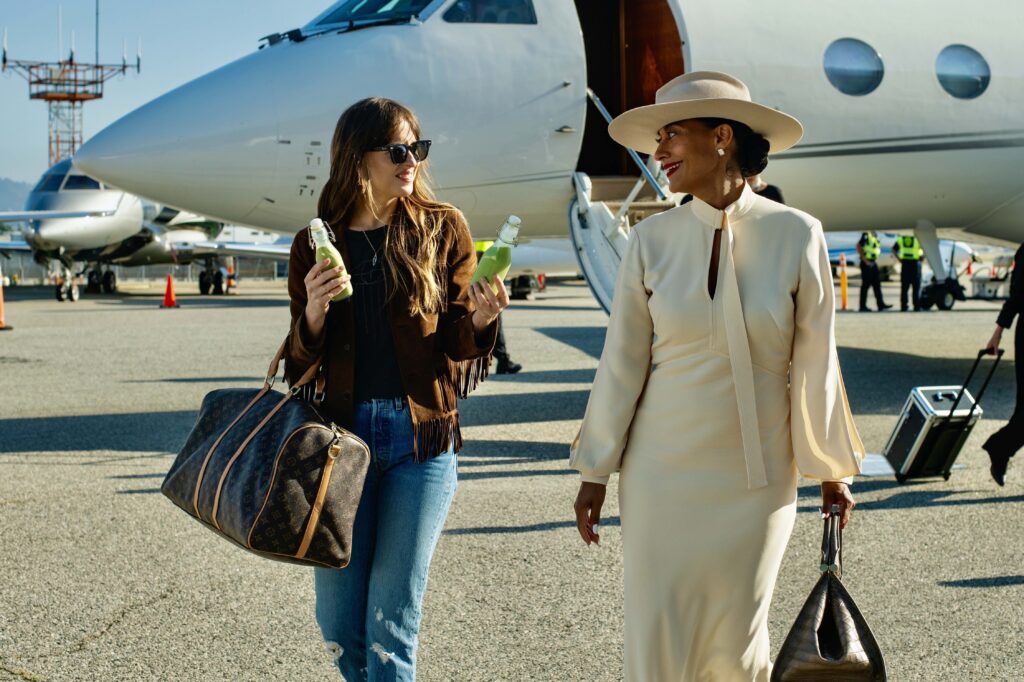
In case anyone wondered, Tracee Ellis Ross is ready for her close-up.
After years on TV (Girlfriends, Black-ish) and supporting roles in minor rom/com movies (In the Weeds, Labor Pains), Ross has a starring role in what should have been a theatrically released film. The pandemic killed that. Instead, this music industry story will debut on VOD. That may not be the glamorous premiere some had envisioned, but there is a benefit. The smaller screen makes The High Note a bit more accessible to a much larger audience and covers up some blemishes.
The team backing this project is pretty stellar. Singer/songwriter Corinne Bailey Rae (“Put Your Records On”) and songwriter Sarah Aarons (“The Middle”) wrote the tunes that producer Rodney Jerkins (Whitney, Michael, Beyoncé) spins into the soundtrack. Screenwriter Flora Greeson marks her feature film debut. TV director Nisha Ganatra (Brooklyn Nine-Nine, Dear White People) follows up her successful directing gig on the film Late Night with this venture. Drumroll…
Maggie (Dakota Johnson, Fifty Shades of Grey), a twentysomething personal assistant, can barely keep her wits about her. Her boss Grace Davis (Ross) is a very demanding, self-centered, insecure superstar singer whose career stalls as she hits the tender age of 40. Too old to be a rising star. Too young for a farewell tour. Nipping at Grace’s heels is her greedy manager Jack (Ice Cube), who is determined to ease her out of recording and into a Vegas residency—aka the elephant burial ground.
Grace is torn between fighting for her career and relevancy or slipping into quasi-retirement. Maggie is on the opposite trajectory. She’s a servant/organizer/nursemaid/confidante by day. A fledgling music producer by night. Maggie’s destiny changes when she meets the young musician David Cliff (Kelvin Harrison Jr., Monsters and Men), who sings for tips at a chic LA market. She sees potential. He sees a savior. Fate sees two predestined lovers.
This foray into the music world is mildly reminiscent of 2018’s A Star Is Born. Viewers get a trip backstage and into studios where artists plot their creative moves. This depiction is slightly glossy (Bohemian Rhapsody), never raw (Sid and Nancy) and not too artsy (Rocketman). Simple enough to follow, emotional and dramatic enough to sustain interest.
Greeson’s script gets the job done. The romantic angles will keep viewers glued to their chairs even when the music career stuff gets a bit cliché. The spats between Grace and Maggie have mother/daughter, boss/employee dynamics. The realities of growing old in a young person’s industry will strike a chord with some. Certainly, the characters don’t run much deeper than a pop tune, but there are enough hooks to keep you guessing. Everything builds to a worthy crescendo that should dissuade folks from hitting the remote.
Ganatra pulls animated performances out of her cast. She does particularly well guiding Ross, who manages to harness her usually grand gesture acting style into a more subtle performance. Scenes are lively, well composed and the film keeps a tone that is consistent throughout.
What’s on view fits snugly in the dra/mus/rom genre, and anyone looking for that kind of fix will be satisfied. Also, if your vision of Los Angeles is incessant sunshine, a beachy mellow vibe, artists searching for someone who can boost their careers and overindulgent rich people with New Age eccentricities—it’s all here on-screen: When Grace thinks she might have a booty call date, she, with no shame whatsoever, instructs Maggie: “Can you make sure the sexology oil is in my bathroom?”
From Ross’ ornate, bright costumes to Johnson’s modest California girl stylings, the cast wears Jenny Eagen’s (Knives Out, Beasts of No Nation) clothes like they are second skins. The actors traipse in and out of palatial homes, music biz offices and modest beach cottages with zest, thanks to Theresa Guleserian’s (Valley Girl) production design, Melissa M. Levander’s set design and Erika Toth’s (Booksmart) art direction. The film’s steady rhythm gets its beat from Wendy Greene Bricmont’s astute editing. One hundred-and-thirteen minutes roll by in a breeze.
Dakota Johnson, a daughter of Hollywood celebrities, is born for the role of Maggie. Her interpretation of the innocent but nicely ambitious personal assistant is her best performance ever and almost erases the unsettling memory of the Thirty Shades… movies. When Kelvin Harrison Jr. first appears on screen as the mysterious singer, he seems undistinguished. Initially, his vocals are ho-hum at best. As the film progresses, it becomes apparent that his character has an arc, and he is on a learning curve. He matures musically and his singing becomes stronger. Watching Harrison illuminate Cliff’s metamorphosis is refreshing.
Ice Cube brings an edge to the manager role. Just enough to make you believe that if Jack doesn’t get his way he could pull a Suge Knight. It’s a roughness the film needs. June Diane Raphael as a Kato Kaelin-type freeloader is funny. Zoe Chao as a roommate, Bill Pullman playing a dad and Eddie Izzard in a cameo are also vibrant.
It’s nice to see Tracee Ellis Ross shape a new character. Perhaps she’s pulling from her life in the glitzy entertainment industry. Maybe she’s tracing her mother Diana Ross’ path. Doesn’t matter how she gets there, just what she accomplishes. Her performance makes her a viable feature film leading actress. Can she sing? Listening to her vocals on the film’s single Love Myself is quite convincing. Pleasant styling, phrasing and voice.
Based on the writing, direction, acting and tech elements, the careers for everyone involved in this film should go up a notch.
The High Note is light on substance, heavy on entertainment value and a definite guilty pleasure.
Visit NNPA News Wire Film Critic Dwight Brown at DwightBrownInk.com and BlackPressUSA.com.